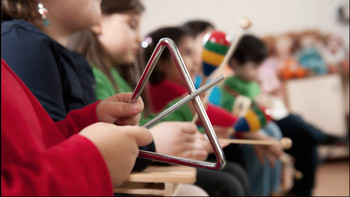
I would teach children music, physics, and philosophy; but most importantly music, for the patterns in music and all the arts are the keys to learning. – Plato
Although we are often keen on discarding music in school as a mere pastime, many great men and women in the distant and not so distant history, including Plato, Aristotle, Jef Raskin, Julie Garwood and Hillary Clinton, have emphasized music as the crucial and potent instrument for education. Being a significant contributor to the kids’ development, music deserves a special place throughout children’s developmental stages, especially in the early childhood. Here are some more specific ways kids can benefit from being exposed to music in their early childhood.
Learning simply from the exposure to music
Even when it’s not thought of as a subject, simply listening to music can have multiple benefits for the kids’ development. Exposure to music helps children develop a richer vocabulary and speak more clearly. It also aids in emotional and social skills. As a background for dancing, music also provides kids with the tools to strengthen their motor skills and create a stronger bond between the mind and body. Singing along to a song improves their pronunciation and singing voice.
Taking it a step beyond – playing music
Learning to play an instrument clearly has a beneficial impact on one’s mind, because it impacts the intelligence with a set of new and valuable information. This is the main idea behind the theory that playing an instrument contributes to the kids’ overall academic success. Some studies have even shown that learning to play an instrument can shape brain development, which includes not only intelligence, but also behaviour.
Music as an instrument of socializing
Humans are social beings, and kids have the inborn need to relate to their peers and make friends. Music has the ability to decrease stress and anxiety levels and create connections between people. Just try to watch a group of kids in a learning centre in the moment when the music starts. Most frequently they turn to each other, and sometimes grab hands. Furthermore, participating in activities related to music (dancing, playing an instrument or singing), gives kids a sense of confidence which can later be translated into interpersonal relationships and academic performance.
The role of music in educational institutions
Because of these benefits, music needs to be present in the educational system, from the early childhood learning centres to high schools and college. When looking to enrol your kids in an educational institution, this is one of the aspects you must not fail to check. One good example of implementing music into a quality learning program is the reputable Moorabbin early learning centre which includes using a music wall and providing a singing and movement experience.
The role of parents in musical education
Parents have a decisive role in introducing their children to music. A rich musical environment in the child’s home fosters love for music and improves musical ability. When you enjoy music with your children, you are creating a unique bond and becoming closer to your little ones. So, you should be aware that besides the benefits for children development, there are plenty of other gains in sharing music with your kids.
Other essential benefits of music in early childhood
Besides the mentioned good changes music can bring into the lives of little children, there are other ways exposure to music can have a positive impact on the kids’ development. For example, it can help them learn about emotions, by labelling songs as happy, sad or scary, based on the feeling they inspire in them. Furthermore, it encourages kids to follow routines by listening to songs about cleaning, waking up, etc. Music is a window into a whole set of thinking skills, from linking the cause to the consequence to noticing changes in the depth of the sound and the pace of the composition.
It is obvious that music has a major role in children’s learning. This is not necessarily just in terms of intelligence, but also in terms of their emotional, social and physical development. Developing a culture of musical learning in the house and in educational centres is, therefore, essential for the wellbeing of all the kids around the globe.
